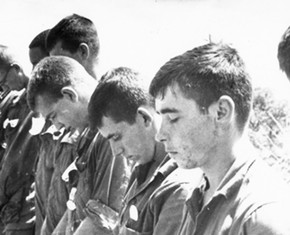The views expressed in our content reflect individual perspectives and do not represent the authoritative views of the Baha'i Faith.
When you read the writings of Baha’u’llah and Abdu’l-Baha, you’ll soon reach an unmistakable conclusion – that they focus a great deal of attention on the establishment of world peace.
In fact, Abdu’l-Baha said “there is no more important matter in the world than that of universal peace”:
There is not one soul whose conscience does not testify that in this day there is no more important matter in the world than that of universal peace. …
But the wise souls who are aware of the essential relationships emanating from the realities of things consider that one single matter cannot, by itself, influence the human reality as it ought and should, for until the minds of men become united, no important matter can be accomplished. At present universal peace is a matter of great importance, but unity of conscience is essential, so that the foundation of this matter may become secure, its establishment firm and its edifice strong.
Therefore Baha’u’llah, fifty years ago, expounded this question of universal peace at a time when He was confined in the fortress of Akka and was wronged and imprisoned. He wrote about this important matter of universal peace to all the great sovereigns of the world, and established it among His friends in the orient. The horizon of the east was in utter darkness, nations displayed the utmost hatred and enmity towards each other, religions thirsted for each other’s blood, and it was darkness upon darkness. At such a time Baha’u’llah shone forth like the sun from the horizon of the east and illumined Persia with the lights of these teachings.
Among His teachings was the declaration of universal peace. People of different nations, religions and sects who followed Him came together to such an extent that remarkable gatherings were instituted consisting of the various nations and religions of the east. Every soul who entered these gatherings saw but one nation, one teaching, one pathway, one order … – Abdu’l-Baha, Selections from the Writings of Abdu’l-Baha
Baha’u’llah, from the very beginning of his revelation and the establishment of his Faith, counseled the world’s leaders and its peoples to come together in peace. He openly and forthrightly advocated disarmament, the limitation of the size of military forces, and the establishment of a democratic system of global governance to ensure the permanent establishment and enforcement of universal peace. When Baha’u’llah passed away in 1892 he appointed his eldest son Abdu’l-Baha as his successor, and Abdu’l-Baha continued, for the next 29 years until he passed away, the Baha’i proclamation of peace, ultimately becoming one of the world’s leading peace advocates.
Despite that revelatory message, during Abdu’l-Baha’s tenure as his father’s appointed successor and as the Exemplar for the Baha’is, the world went to war. Baha’u’llah had warned world leaders that if they did not stop their relentless stockpiling of armaments and their increasing hostility toward one another, war was inevitable.
In June of 1914 World War I began when an assassin’s bullet killed Archduke Ferdinand in Sarajevo in the Balkans. However, that horrific war, which took 16 million lives by becoming a virtual human slaughterhouse, actually started many years before, when a whole host of European nations and kingdoms began accumulating large storehouses of weapons and ammunition in an unprecedented “defense” build-up. Terrified that their absolute dictatorial rule might come to an end as democracy began its global ascendency, many of Europe’s monarchs, oligarchs and tyrants spent their countries into near-bankruptcy to increase their store of weapons, ships and armies during that pre-war period.
The Industrial Revolution and its improved methods of production made the stockpiling of weapons, ships and even the new flying machines called airplanes into a high-stakes competitive battle between countries that far exceeded any war-making capacity in humanity’s past history.
Long before that unprecedented arms race of the late 19th century began, though, Baha’u’llah had warned the world’s political and religious leaders about their excessive spending, their elaborate preparations for war and the great injustice they perpetrated upon their peoples:
We beseech God to assist the kings of the earth to establish peace on earth. …
O kings of the earth! We see you increasing every year your expenditures, and laying the burden thereof on your subjects. This, verily, is wholly and grossly unjust. Fear the sighs and tears of this Wronged One, and lay not excessive burdens on your peoples. Do not rob them to rear palaces for yourselves; nay rather choose for them that which ye choose for yourselves. Thus We unfold to your eyes that which profiteth you, if ye but perceive. Your people are your treasures. Beware lest your rule violate the commandments of God, and ye deliver your wards to the hands of the robber. …
O rulers of the earth! Be reconciled among yourselves, that ye may need no more armaments save in a measure to safeguard your territories and dominions. Beware lest ye disregard the counsel of the All-Knowing, the Faithful.
Be united, O kings of the earth, for thereby will the tempest of discord be stilled amongst you, and your peoples find rest, if ye be of them that comprehend. – Baha’u’llah, The Summons of the Lord of Hosts
In his travels, and in his hundreds of speaking engagements and meetings with industrialists, public figures and political leaders throughout the Western world between 1910 and 1913, Abdu’l-Baha continued to urge peace and demilitarization on the world’s rulers and its peoples. In a letter written to a British Baha’i later published in England, he summarized those meetings and warned:
… before all the meetings in the West I cried out: “O ye thinkers of the world ! O ye philosophers of the Occident! O ye scholars and sages of the earth! A threatening black cloud o’ershadows, which ere long shall envelop the horizon of humanity; an impetuous tempest is ahead, which shall shatter to splinters the ships of the lives of mankind, and a turbulent, furious torrent shall soon drown the countries and nations of Europe. Awaken ye! Awaken ye! Become ye mindful! Become ye mindful! Thus in the spirit of co-operation we may all arise with the utmost magnanimity and through the Favor and Providence of God hold aloft the flag of the Oneness of Humanity, promote the essentials of Universal Peace and deliver the inhabitants of the world from this Most Great Danger! – Abdu’l-Baha, Star of the West
Abdu’l-Baha wrote that Europe had become a tinderbox, an overloaded powder keg that the slightest spark could ignite:
While travelling in Europe and America I met altruistic and sanctified souls who were my confidants and associates concerning the question of Universal Peace and who agreed with me and joined their voices with mine regarding the principle of the Oneness of the World of Humanity; but alas, they were very few! The leaders of public opinion and the great statesmen believed that the massing of huge armies and the annual increase of military forces insured peace and friendship among nations. At that time I explained that this theory was based on a false conception; for it is an inevitable certainty that these serried ranks and disciplined armies will be rushed one day into the heat of the battlefield and these inflammable materials will unquestionably be exploded and the explosion will be through one tiny spark; then a world conflagration will be witnessed, the lurid flames of which shall redden all the horizons. Because the sphere of their thoughts was contracted and their intellectual eyes blind they could not acknowledge the above explanation. – Ibid.
This prescient explication of the falsity of the doctrine of “mutually-assured destruction” – the bizarre proposition which insists that a heavily-armed group of powerful, competing nations would constitute a countervailing “balance” of military power and thus protect the world from war – has prevailed since the latter part of the 19th century, and still prevails now among the world’s nuclear powers.
This mistaken doctrine of “mutually-assured destruction,” often referred to with its fitting acronym MAD, culminated in the two devastating World Wars of the 20th century – exactly as the Baha’i teachings predicted it would.
The Baha’i teachings warned the world’s leaders, in writing and on multiple occasions, that the consequences of their arms races and military build-ups would turn tragic. Today, we have an even more mad weapons stockpile, and a spark in one place could ignite it.
How do the Baha’i teachings recommend we deal with that dire threat? In the next essay in this series, we’ll examine four simple steps Abdu’l-Baha listed in the Baha’i prescription for universal peace.
















Comments
Sign in or create an account
Continue with Googleor